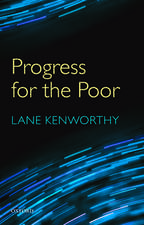Third Way Reforms: Social Democracy after the Golden Age
Autor Jingjing Huoen Limba Engleză Paperback – 16 dec 2015
| Toate formatele și edițiile | Preț | Express |
|---|---|---|
| Paperback (1) | 324.24 lei 6-8 săpt. | |
| Cambridge University Press – 16 dec 2015 | 324.24 lei 6-8 săpt. | |
| Hardback (1) | 632.38 lei 6-8 săpt. | |
| Cambridge University Press – 26 apr 2009 | 632.38 lei 6-8 săpt. |
Preț: 324.24 lei
Nou
Puncte Express: 486
Preț estimativ în valută:
62.05€ • 64.61$ • 52.44£
62.05€ • 64.61$ • 52.44£
Carte tipărită la comandă
Livrare economică 11-25 martie
Preluare comenzi: 021 569.72.76
Specificații
ISBN-13: 9781316501108
ISBN-10: 1316501108
Pagini: 374
Ilustrații: 83 b/w illus. 14 tables
Dimensiuni: 151 x 248 x 4 mm
Greutate: 0.57 kg
Editura: Cambridge University Press
Colecția Cambridge University Press
Locul publicării:New York, United States
ISBN-10: 1316501108
Pagini: 374
Ilustrații: 83 b/w illus. 14 tables
Dimensiuni: 151 x 248 x 4 mm
Greutate: 0.57 kg
Editura: Cambridge University Press
Colecția Cambridge University Press
Locul publicării:New York, United States
Cuprins
1. Introduction; 2. Theorizing the third way; 3. Constraints on action: institutions and ideas; 4. Prelude to the third way; 5. Expansion in active protection; 6. Restructuring passive protection; 7. Economic and corporatist contexts for the third way; 8. Theories of possibilities.
Recenzii
“Anyone who wishes to understand the changes in political-economic strategies European Social Democrats have undergone in the past two decades will want to turn to Huo’s detailed account. It provides a comprehensive overview, organized within a clear analytical framework that enables us to identify the differential explanatory power of important theoretical frameworks commonly employed in the comparative study of welfare states and macro-economic policy-making. More generally, Huo’s study helps to grasp the dynamic of institutional change.”
-Herbert Kitschelt, Duke University
“This book marks a major leap forward in the study of social democracy. Analyzing the theory and implementation of ‘Third Way’ reforms in exhaustive detail across nine cases, spanning Scandinavia, Western Europe and the Antipodes, Huo engages critically with the mainstream approaches in the literature, including the notion of path-dependence in determining policy outcomes, proposing a power-resources argument in their stead. His contention that the ‘Third Way’ is a principled renewal rather than a retreat from social democratic tradition will raise plenty of controversy.”
-Martin Rhodes, University of Denver
“No one has conceptualized so clearly social democratic ‘third-way’ policies as Huo does in this book. Nor has anyone provided such an insightful analysis of their development, implementation and degrees of success in a relatively large number of countries. The central argument is important: partisan politics and governance, especially social democratic party electoral success and rule, while institutionally constrained, is the key to understanding cross-national differences and change in labor market and employment policies in post-industrial democracies. The book can be highly recommended to all students and scholars of comparative and European political economy.”
-Duane Swank, Marquette University
-Herbert Kitschelt, Duke University
“This book marks a major leap forward in the study of social democracy. Analyzing the theory and implementation of ‘Third Way’ reforms in exhaustive detail across nine cases, spanning Scandinavia, Western Europe and the Antipodes, Huo engages critically with the mainstream approaches in the literature, including the notion of path-dependence in determining policy outcomes, proposing a power-resources argument in their stead. His contention that the ‘Third Way’ is a principled renewal rather than a retreat from social democratic tradition will raise plenty of controversy.”
-Martin Rhodes, University of Denver
“No one has conceptualized so clearly social democratic ‘third-way’ policies as Huo does in this book. Nor has anyone provided such an insightful analysis of their development, implementation and degrees of success in a relatively large number of countries. The central argument is important: partisan politics and governance, especially social democratic party electoral success and rule, while institutionally constrained, is the key to understanding cross-national differences and change in labor market and employment policies in post-industrial democracies. The book can be highly recommended to all students and scholars of comparative and European political economy.”
-Duane Swank, Marquette University
Notă biografică
Descriere
This book examines the transformation of contemporary social democracy through the concept of 'third way' reforms in nine OECD countries.















